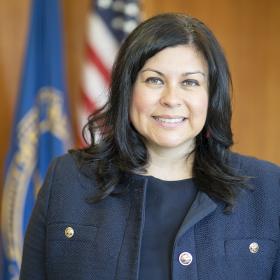Melanie Fontes Rainer, director of the Office for Civil Rights (OCR) at the U.S. Department of Health & Human Services, will discuss privacy and civil rights issues in health care at a Nov. 13 event hosted by the Weidenbaum Center on the Economy, Government, and Public Policy in Arts & Sciences at WashU.
The event will take place from 1-2 p.m. in Seigle Hall, Room L006. It is free and open to all, but organizers request reservations by Nov. 7. Complimentary parking will be available in the visitor section of Snow Way Garage.

The issue of privacy and protecting civil rights has become a significant concern in health care since the fall of Roe v. Wade, Rainer said. Providers have expressed concerns that when patients travel to their clinics for lawful care, their patients' records will be sought, including when the patient goes home, she said.
"Patients and providers are scared, and it impedes their ability to get and to provide accurate information and access to safe and legal health care," Rainer said.
Rainer's talk will focus on OCR's recent efforts to strengthen nondiscrimination protections and advance civil rights in health care. These efforts include the HIPAA Privacy Rule to Support Reproductive Health Care Privacy, also known as Section 1557 of the Affordable Care Act - which prohibits discrimination on the basis of race, color, national origin, age, disability or sex, including pregnancy, sexual orientation, gender identity and sex characteristics - and the "Discrimination on the Basis of Disability in Health and Human Service Programs or Activities" rule, which strengthens the protections afforded by Section 504, a landmark civil rights law.
"Traveling across the country, I have heard too many stories of people facing discrimination in their health care. The robust protections of these rules are needed now more than ever.
"Whether it's standing up for LGBTQI-plus Americans nationwide, making sure that care is more accessible for people with disabilities or immigrant communities, or protecting patients when using AI in health care, OCR protects Americans' rights," Rainer said.






